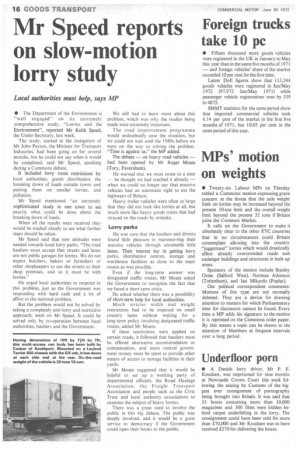Mr Speed reports Foreign trucks
Page 18

If you've noticed an error in this article please click here to report it so we can fix it.
on slow-motion lorry study
Local authorities must help, says MP • The Department of the Environment is "well engaged– on its extremely comprehensive study, "Lorries and the Environment", reported Mr Keith Speed, the Under-Secretary, last week.
The study, started at the instigation of Mr John Peyton, the Minister for Transport Industries, had been going on for several months, but he could not say when it would be completed, said Mr Speed, speaking during a Commons debate.
It included lorry route restrictions by local authorities, goods distribution, the breaking down of loads outside towns and putting them on smaller lorries, and pollution.
Mr Speed mentioned "an extremely sophisticated study in one town to see exactly what could be done about the breaking down of loads.
When all the results were received they would be studied closely to see what further steps should be taken.
Mr Speed said that new attitudes were needed towards local lorry parks. "The road hauliers must accept that streets and lanes are not public garages for lorries. We do not expect butchers, bakers or furnishers or other shopkeepers to use the streets as their shop premises, and so it must be with lorries."
He urged local authorities to respond to this problem, just as the Government was responding with hard cash and a lot of effort to the national problem.
But the problem would not be solved by taking a completely anti-lorry and restrictive approach, went on Mr Speed. It could be solved only by co-operation between local authorities, hauliers and the Government.
We still had to learn more about this problem, which was why the studies being made were extremely important.
The road improvement programme would undoubtedly ease the situation, but we could not wait until the 1980s before we were on the way to solving the problem. "Time is against us," the MP added.
The debate — on heavy road vehicles — had been opened by Mr Roger Moate (Tory, Faversham).
He warned that we must come to a time he thought we had reached it already — when we could no longer say that massive vehicles had an automatic right to use the highways of Britain.
Heavy trailer vehicles were often so large that they did not look like lorries at all, but much more like heavy goods trains that had strayed on the roads by mistake. ,
Lorry parks
He was sure that the hauliers and drivers found little pleasure in manoeuvring their massive vehicles through unsuitable little lanes. Their interest lay in getting lorry parks, distribution centres, storage and warehouse facilities as close to the main routes as was possible.
Even if the long-term answer was designated traffic routes, Mr Moate asked the Government to recognize the fact that we faced a short-term crisis.
He asked whether there was a possibility of short-term help for local authorities.
Much stricter width and weight restrictions had to be imposed on small country lanes without waiting for a long-term policy involving designated traffic routes, added Mr Moate.
If these restrictions were applied on certain roads, it followed that hauliers must be offered alternative accommodation or compensation, and more central government money must be spent to provide other means of access to storage facilities in their yards.
Mr Moate suggested that it would be helpful to set up a working party of departmental officials. the Road Haulage Association. the Freight Transport Association and people such as the Civic Trust and local authority associations to examine the subject of heavy lorries.
There was a great need to involve the public in this big debate. The public was deeply involved, and. it would be a great service to democracy if the Government could open their books to the public.




























































































